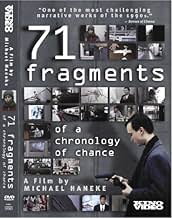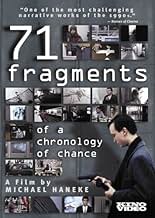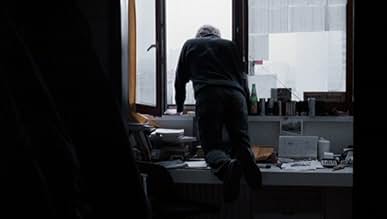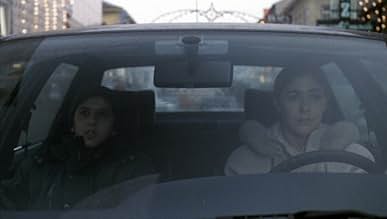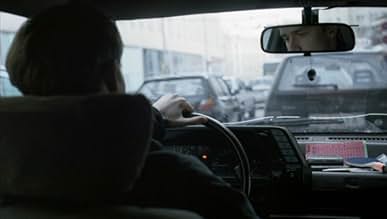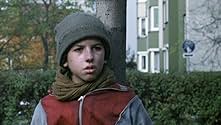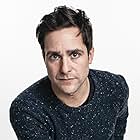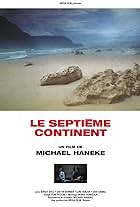71 Fragments of a Chronology of Chance
Original title: 71 Fragmente einer Chronologie des Zufalls
IMDb RATING
7.1/10
9.3K
YOUR RATING
71 scenes revolving around a recent immigrant, a couple that has just adopted a daughter, a college student and a lonely old man.71 scenes revolving around a recent immigrant, a couple that has just adopted a daughter, a college student and a lonely old man.71 scenes revolving around a recent immigrant, a couple that has just adopted a daughter, a college student and a lonely old man.
- Awards
- 4 wins & 1 nomination total
Michael Jackson
- Self
- (archive footage)
- (uncredited)
- Director
- Writer
- All cast & crew
- Production, box office & more at IMDbPro
Featured reviews
Mr. Michael Haneke begs the audience to start asking the important questions.
The film begins with a text of a news item involving a bank shooting incident in Vienna a day before Christmas eve 1993 that left three people dead with the 19-year-old assailant later found to have shot himself nearby.
What then follows is a series news broadcasts interspersed with scenes involving seemingly random characters while they go through their day-to-day existence: a Romanian refugee who illegally entered Austria seeking asylum, a soldier, an armored van security guard, a college student, a couple having trying to adopt a kid, and elderly man and his bank employee daughter.
The film is, as the title indicates (and I'll take the filmmaker's word on that), there are a total of "71 fragments" divided into segments that are separated by almost three seconds of black frames. I actually took trouble counting those (because I don't have a life) and found out that--
The different characters are shown going through mundane activities throughout the film and it gives the viewers an insight to human behaviour and the dynamic between the characters whose connection to the other charcters are more evident than some. They are also seen to be watching these same news broadcasts in their respective environments apart from the segments that solely featured these news items being played on-screen, which in a way connects almost every person in this film.
Mr. Haneke has a style all to his own. He's a master in evoking fright without necessarily having to show much, this will be apparent near the end of the film, the Haneke genius I'd say, just as gruesome. This is not one of his best work but it stands out on its own for the always-relevant commentary that he wishes to expound.
The narrative that Mr. Haneke wanted to express could only be realized through a closer scrutiny of the various fragments which eventually points to a far greater tragedy, and he also throws in a fair warning as well. The same thing could also can be said regarding the conflicts around the world. We see the news on TV, the horrific images, the drama, yet something is lacking. What were the events that led up to the tragic outcome that we all get to witness on the screen? Clearly, there are some people who know more than others and the news reporters seem not to be able to get to those people for some reason or another, it is this incompleteness that kind of detaches us, the viewers, from the horror, and there are people taking advantage of other people's silence and rendering them just as complicit to those acts of violence.
My rating: A-minus.
The film begins with a text of a news item involving a bank shooting incident in Vienna a day before Christmas eve 1993 that left three people dead with the 19-year-old assailant later found to have shot himself nearby.
What then follows is a series news broadcasts interspersed with scenes involving seemingly random characters while they go through their day-to-day existence: a Romanian refugee who illegally entered Austria seeking asylum, a soldier, an armored van security guard, a college student, a couple having trying to adopt a kid, and elderly man and his bank employee daughter.
The film is, as the title indicates (and I'll take the filmmaker's word on that), there are a total of "71 fragments" divided into segments that are separated by almost three seconds of black frames. I actually took trouble counting those (because I don't have a life) and found out that--
The different characters are shown going through mundane activities throughout the film and it gives the viewers an insight to human behaviour and the dynamic between the characters whose connection to the other charcters are more evident than some. They are also seen to be watching these same news broadcasts in their respective environments apart from the segments that solely featured these news items being played on-screen, which in a way connects almost every person in this film.
Mr. Haneke has a style all to his own. He's a master in evoking fright without necessarily having to show much, this will be apparent near the end of the film, the Haneke genius I'd say, just as gruesome. This is not one of his best work but it stands out on its own for the always-relevant commentary that he wishes to expound.
The narrative that Mr. Haneke wanted to express could only be realized through a closer scrutiny of the various fragments which eventually points to a far greater tragedy, and he also throws in a fair warning as well. The same thing could also can be said regarding the conflicts around the world. We see the news on TV, the horrific images, the drama, yet something is lacking. What were the events that led up to the tragic outcome that we all get to witness on the screen? Clearly, there are some people who know more than others and the news reporters seem not to be able to get to those people for some reason or another, it is this incompleteness that kind of detaches us, the viewers, from the horror, and there are people taking advantage of other people's silence and rendering them just as complicit to those acts of violence.
My rating: A-minus.
This film is the last in Michael Haneke's trilogy about alienation called "Vergletscherung die Gefühle", and it ends in a violent climax which is a result of the previous fragments that Haneke presents to us. In this film Haneke developed a style that is very reminiscient of his 2000 film "Code Inconnu". It features rather short episodes, and within each episode there is scarcely editing or camera movement. Each episode is divided by a second's black screen, and Haneke often interrupts and ends the episode in the middle of a person's sentence. This is a very economical style of filmmaking, and it certainly demands a lot of the viewers, because you only get the information you really need to connect this episode thematically to the others. Because this is a thematic film, and it is a brilliant, stylish, ice-cold half-misanthropic study of people's lack of ability to perform tender acts with each other. I have never seen people make love in a film by Haneke, except for the masochistic and sad attempts in "La Pianiste". Rather, Haneke shows his characters in situations where they are tired, fed up, irritated or full of hate; quite ordinary human emotions. You cannot blame Haneke for not being a positive director, for he is the only filmmaker working today who can portray and observe his characters so coldly and so unpassionately. And his project seems to be to expose our lack of love and passion for each other, but most of all our lack of ability to tell it as it is. Speak to each other and solve everything, seems to be Haneke's advice, without him really giving it. I never seem to like Haneke's characters, and that is a good thing really. Like fellow German-speaking directors Herzog and Fassbinder, Haneke seems a bit misanthropic in his characteristics. Too many directors try too hard to give characters sympathetic traits, and you just lose interest in the story. "71 Fragmente einer Chronologie des Zufalls" is quite an achievement in filmmaking, and it is a film that will stick with me forever. I will never forget because I never knew why (the incident at the end). That is how I will remember this film, and how many times in real life is "why" the only question never answered?
A Sample film in 90's about violence and how it improves. Pazzle-like narration with 71 episodes, shows us a story about the history of violence. "71 Fragmente einer Chronologie des Zufalls" has all the signs of a film which could be made in 90's. Haneke is one of the contemporary filmmaker who use the violence scenes to show us how this huge question (why violence?) has no straight answer. 71... is almost look like another haneke's famous film (Code unknown,2000) which both of them are narrating unfinished stories of some journeys. Unexpected final scenes and also, unexpected shocking shots are two icons in this film like another Haneke's films. Haneke's style is like the way Robert bresson made films. Bresson's cinematograph and also Hitchcock's suspense are affected in his cinema. His cinema invites us to watch untold stories about complicated questions of contemporary world.
A fine movie that explores the lives of many strangers in Austria that are connected by the same thing: all their lives are pointless and meaningless. Though the pace is slow all the scenes work to the conclusion that is the only solution to break the deadlock. A thought-provoking film.
I must say that I really enjoyed this movie. The subtle exploration of the character in very personal en realistic scenes were executed in the perfect cinematic way (framing, staging, blocking, pacing, editing). The way Haneke used (the lack
of) cohesive plot really caught my attention and made me excited about how the story was going to unfold. Though the end was a bit unsatisfying for me. I wasn't drawn enough to the characters to experience a emotional climax through any strong perspective from a character arc. I understanded the thematic exploration but found the climax a bit underwhelming. I'll defintely rewatch to get a hold of more missed details which might immerse me more than my first viewing.
Did you know
- TriviaFilm debut of Sebastian Stan.
- GoofsWhen Tomek (Otto Grünmandl) makes himself dinner, around the 20 minutes mark, there's a mirror in the background that reflects the boom mic.
- ConnectionsFeatured in Mein Leben: Michael Haneke (2009)
- How long is 71 Fragments of a Chronology of Chance?Powered by Alexa
Details
- Release date
- Countries of origin
- Languages
- Also known as
- 71 фрагмент хронології випадковостей
- Filming locations
- Production companies
- See more company credits at IMDbPro
- Runtime1 hour 40 minutes
- Color
- Aspect ratio
- 1.66 : 1
Contribute to this page
Suggest an edit or add missing content

Top Gap
By what name was 71 Fragments of a Chronology of Chance (1994) officially released in India in English?
Answer
